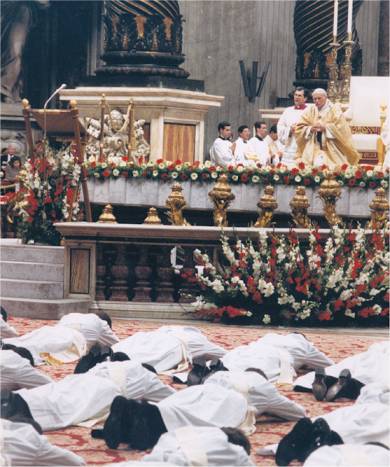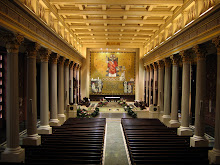My next article for 'The Catholic Moment' appears in this week's edition of the Catholic Telegraph. (I had to make one change, as I missed a few guys who went to Catholic High Schools, much apologies!)
During Catholic Schools Week, I was looking over our files on how many of our seminarians are graduates of Catholic high schools in the Archdiocese. The number surprised me, as I found only nine of 28 of our currents seminarians had done so. I expected a higher number, especially considering we have one of the largest Catholic school systems in the country. Plus, I remember stories of huge numbers of grads from the schools entering the seminary each year, between ten and fifteen every year from Elder High School, alone. Yet now, we have one Elder alumnus in formation. (For the sake of completeness, there is one graduate from each of the following in formation: Alter, Badin, Carroll, Elder, Fenwick, Moeller, LaSalle, Springfield Central Catholic and Summit Country Day.)
To an extent, I can understand the drop off, for I taught in the system the first two years after I was ordained, and I know the pressures first hand that are put on the administrators and teachers by not only the state regulations, but also by the alumni, parents, and even the students. But I still wonder if we might be missing some aspect of education.
I fully admit that when I was teaching, my primary goal was to instruct my students in the ways of the New Testament and the person of Jesus Christ. Yet, there is a further dimension to the process that I missed then, and am only now coming to realize: education, especially in the Catholic sense, is not just about teaching the faith; it is about helping the parents to form their children as disciples of Christ. This is the key, in my understanding, to not only an increase in the number of seminarians, but also the revitalization of the Catholic Schools. It is not enough to teach each student, because the public schools can do that. Rather, each student needs to come to the realization that there is some special path that God is leading him or her down, a path that leads to a unique spot in this world, in the Church, which only this one particular student can do: the mission, (the vocation, in a broader sense) that this student has been given by God to enrich the world. Not a small task, by any means!
Accomplishing this new movement, though, can be done through some easy steps, I believe, and it begins with parental involvement, as they are the ‘first teachers of their children in the way of faith.’ Their witness of discipleship helps to shape their children as disciples. The witness of those who have chosen radical discipleship as a way of life also gives a favorable impression to the next generation. The current class of seminarians are excellent speakers and witnesses of how following Christ as a disciple can lead to a tremendous and wonderful thing. In addition to bringing seminarians to the schools, bring the schools to the seminary or visit convents that in your area. The witness of the aged members of the communities who have served as a religious for 70 years inspires me to want to give even more in my own journey as a disciple.
But even with the witness of those who have given all to following Christ, the next generation will not be able to follow Him if they first do not know Him. Both the Catechism of the Catholic Church and the newer US Catholic Adult Catechism give the basis of the faith, and lead the reader into a deeper relationship with Christ. Both of these wonderful resources are dripping with Scripture citations, highlighting the need to know and read Scripture, for ‘ignorance of Scripture is ignorance of Christ,’ as St. Jerome so wonderfully said.
Finally, a perpetual challenge is to make the connections for the students through the curriculum, especially highlighting how the Church led so many innovations and discoveries throughout history. John Henry Newman stated, in his Apologia Pro Vita Sua, that to be a student of history was to cease being Protestant. His study of history led him from atheism through Anglicanism to the fullness of the Church in Catholicism.
Does the faith highlight and inform everything that happens in our schools? If so, we will be turning out disciples ready to serve Christ in radical ways.
For more information on how to serve Jesus radically as a priest, I invite you to visit www.cincinnativocations.org
Friday, February 29, 2008
Subscribe to:
Post Comments (Atom)










2 comments:
great piece of introspection here
I'm SO THERE! Count me in!
Oh...wait...um...huh...
;-D
OK, seriously, it is a challenge to get through to the parents. The kids are more likely to live holy lives that lead them to the priesthood/religious life if their parents are living out that example themselves. We have high school kids that have to choose between going to Mass on Sunday or staying home with Mom, who feels hurt if her child goes to worship God. Of course, Mom doesn't want to go to Mass and won't darken the door of a church.
We have kids who find rides to get themselves to Mass and have to explain their wherebouts to their "Catholic" parents who refuse to go, or even wake up long enough to drop them off.
We have parents with compartmentalized faith, which is no faith at all.
I love what you say here, and if you can figure out how to evangelize the unreachable parents, let me know!
Post a Comment